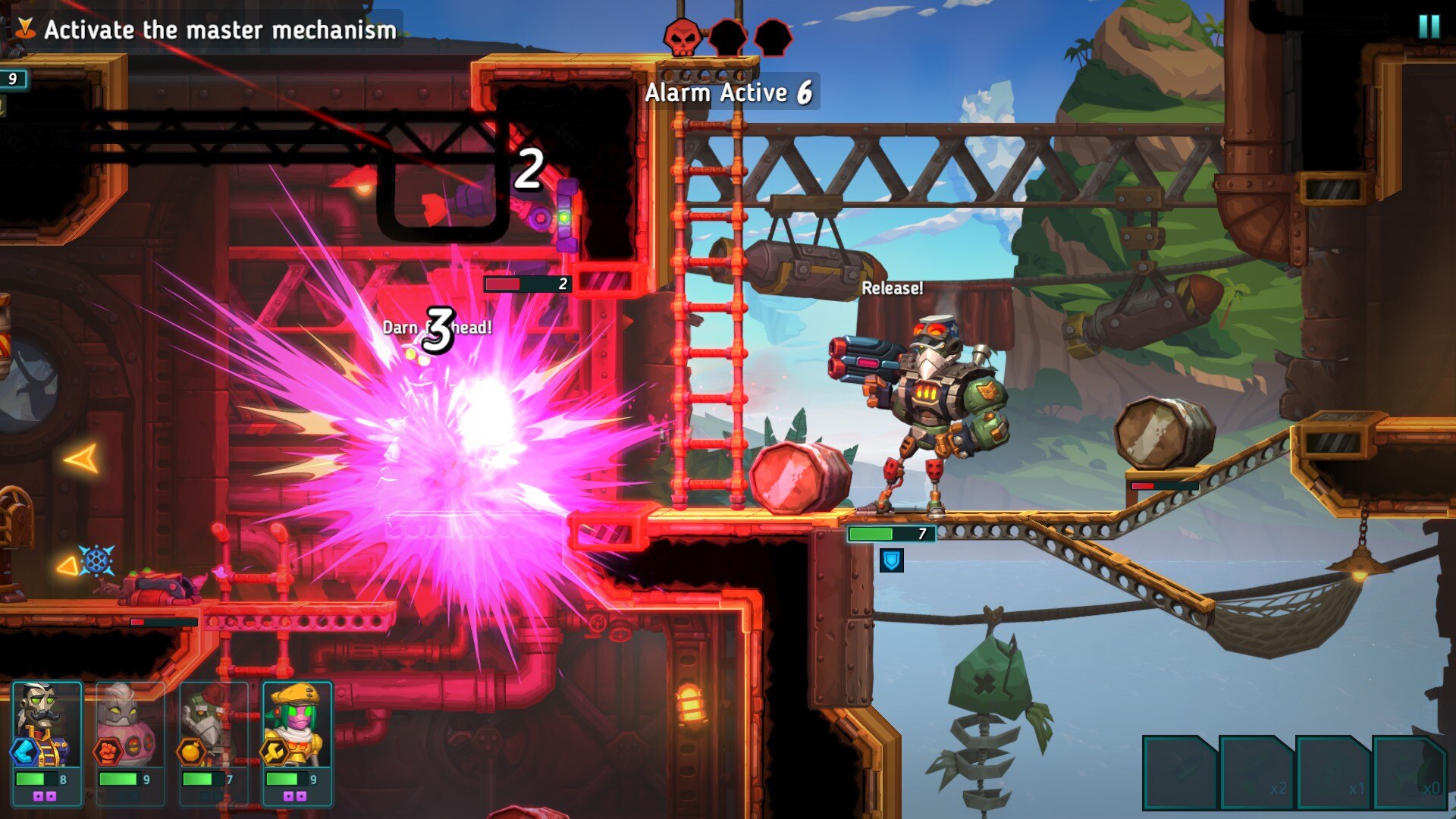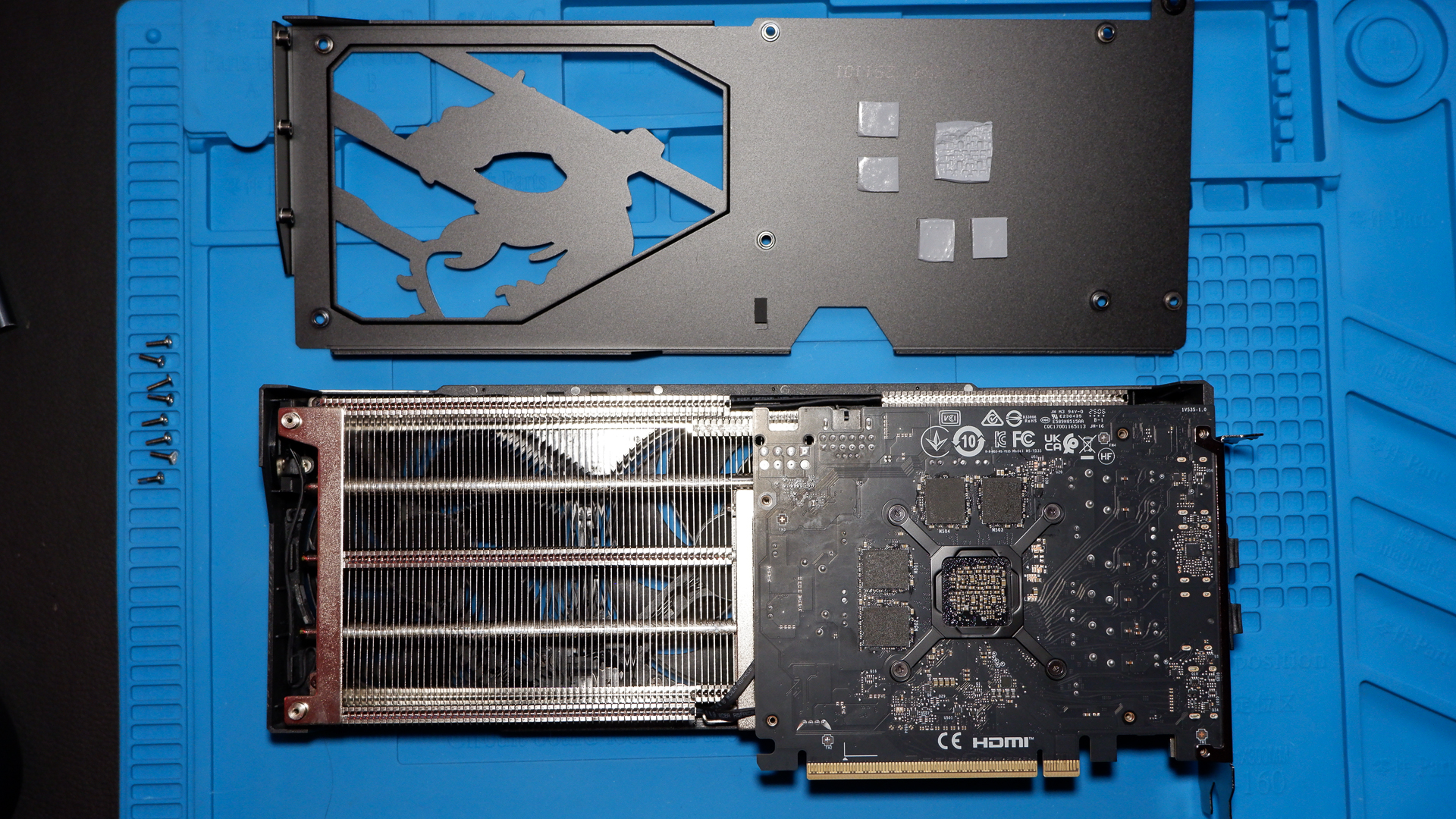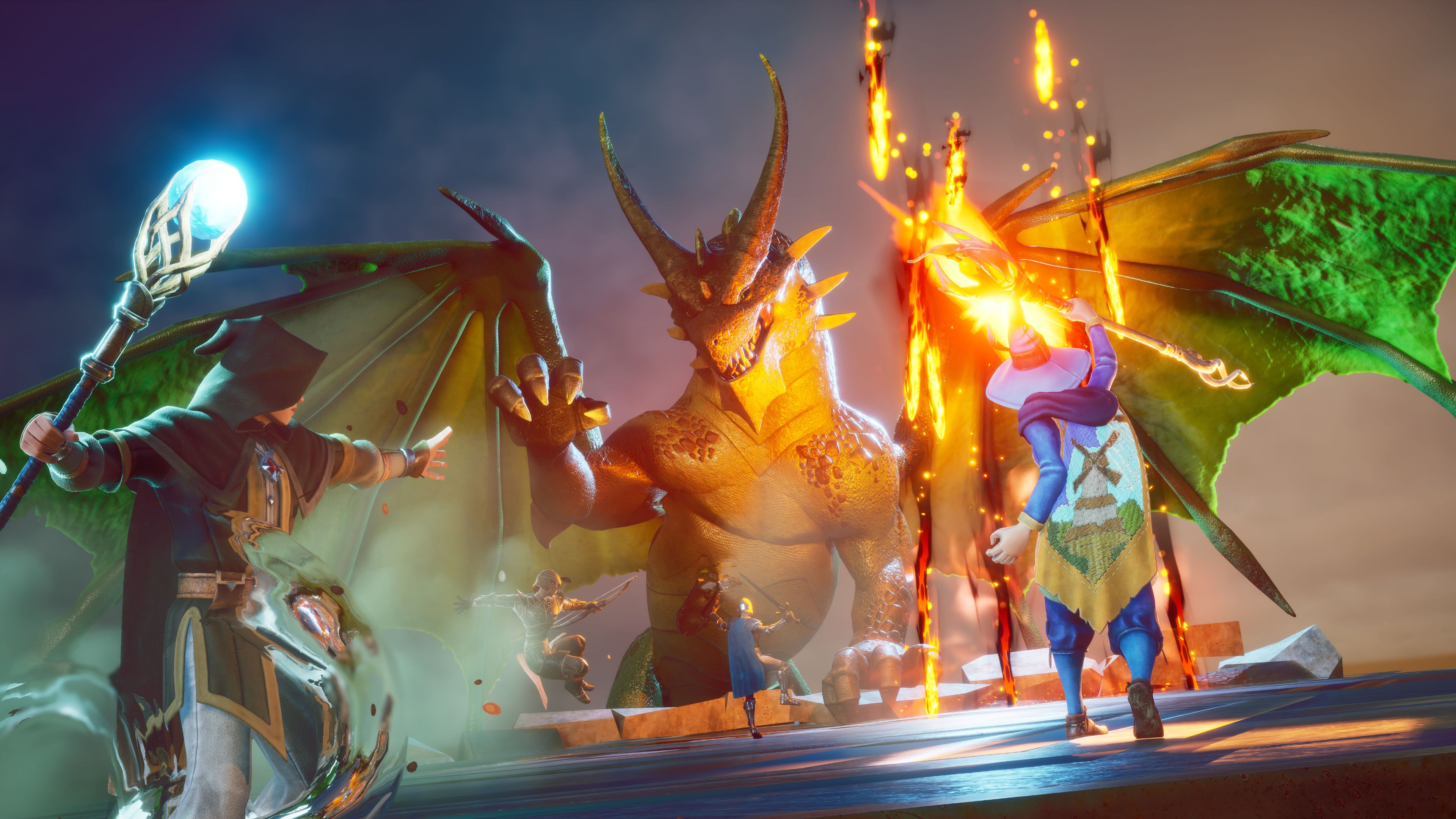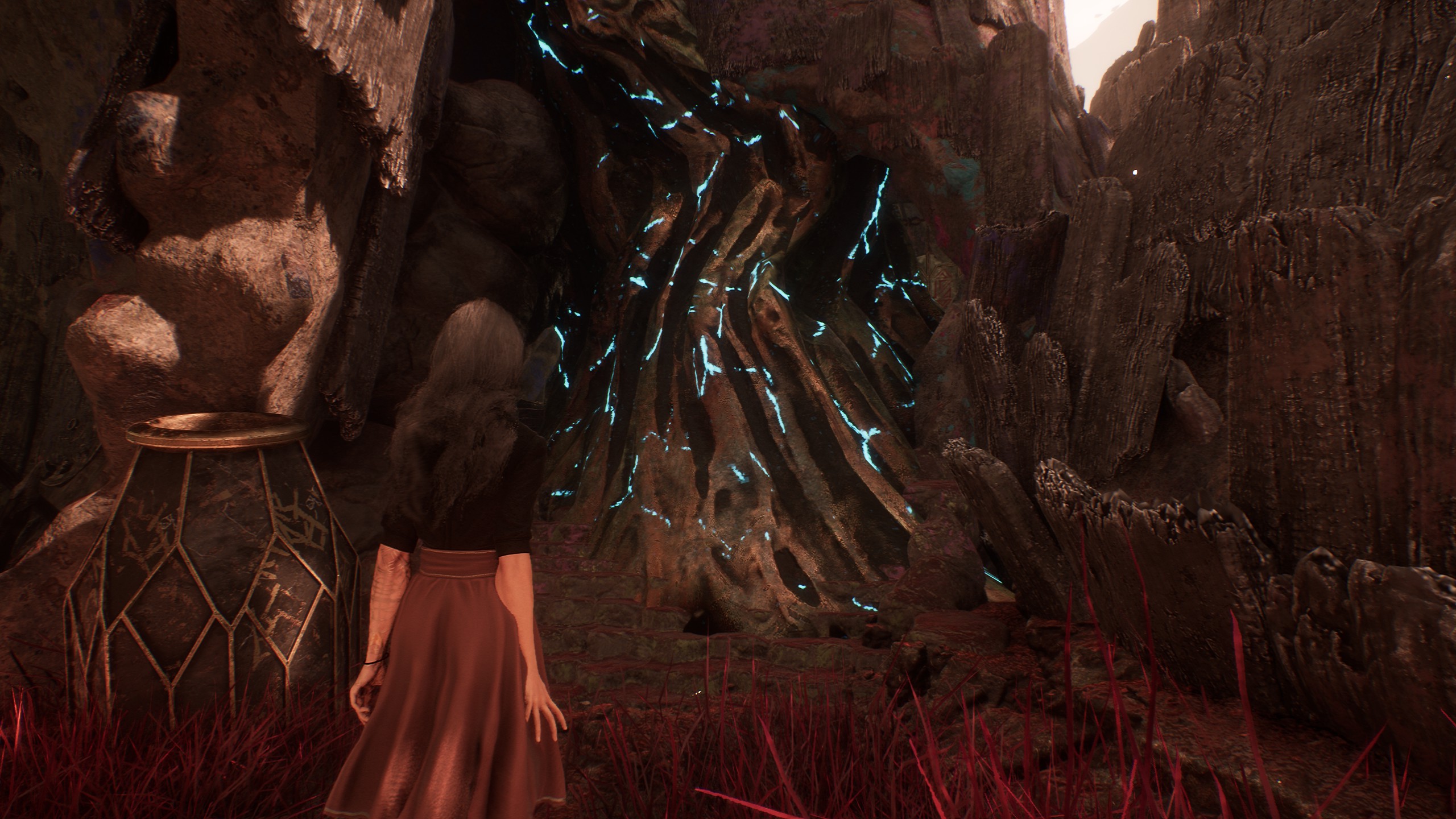
SteamWorld's most ambitious entry yet is packed with satisfying strategy, but it's a little too expansive for its own good.
What is it? A turn-based strategy adventure where you can shoot people’s hats off and steal them.
Release date August 8, 2024
Expect to pay TBC
Developer Thunderful Development
Publisher Thunderful Publishing
Reviewed on Nvidia Geforce RTX 3080, AMD Ryzen 9 5900X, 32GB RAM
Steam Deck Verified
Link Official site
If there’s one concept that’s infinitely more exciting in a videogame than it is in real life, it’s taking on multiple jobs at once. That’s SteamWorld Heist 2’s biggest new innovation—its industrious robot protagonists can now switch freely between different battlefield roles, and combine abilities unlocked in each together. Though there are only six jobs in total, there’s an impressive depth to the amount of different possible combinations, especially compared to the fixed classes of the first game. That’s emblematic of a sequel that expands on its predecessor in almost every way—and stands out as easily the most ambitious SteamWorld game yet.
If you’re not familiar with the series, it’s been merrily trundling along for almost a decade now, dipping into different genres for short but charming adventures. SteamWorld Dig and its sequel were sort of mining platformers, for example, while SteamWorld Quest was a kind of deck-building RPG. There’s a polish and irresistible pace to them that makes them consistently fun, if a little lightweight.
The original SteamWorld Heist was certainly the most impressive of the bunch—a turn-based tactical RPG that played out on 2D battlefields, its clever twist was manual aiming and ricocheting bullets, allowing you to pull off wild trick shots and even shoot people’s hats off to steal for your own wardrobe. Heist 2 takes that great core combat and expands out everything around it, adding an overworld to explore, more progression and equipment for your crew, a more elaborate story, and simply a lot more fights to blast your way through.
You play as the wonderfully named Leeway Krakenbane, a slightly downtrodden pirate captain struggling to make a name for himself under the shadow of his mother, a revered hero. (She’s the one who actually slew the Kraken.) Gathering together a motley crew, he sets out to discover the source of “the Rust”, a mysterious force corrupting the world’s water.
Your journey across the world itself—which is basically the 1700s Caribbean but with steampunk robots instead of humans—plays like a sort of very lightweight metroidvania. Piloting a little submarine, you can search for loot and secrets, battle enemy ships, and earn abilities that allow you to access new areas, such as being able to smash through rock barriers or submerge into deeper water.
(Image credit: Thunderful Development)
Though it does help convey the feeling of a larger adventure, it has to be said that none of this exploration is especially fun. The submarine itself controls like a wonky shopping cart, which makes the real-time ship battles especially feel clumsy, and it travels just slowly enough to make the lack of fast travel grating.
But really it’s all just filler between the real meat of the game, which is its missions, scattered across the map. Each is its own combat scenario, usually focused on stealing important loot as fast as possible before blasting your way to an extraction point while the ever-escalating alarm threatens to overwhelm you with summoned reinforcements.
Nerves of steel
(Image credit: Thunderful Development)
Fights are tense and engaging, always feeling on the cusp of spinning out of control, while giving you ample opportunity to show off with flashy combinations of abilities. The manual aiming adds a wonderful layer of uncertainty that feels like a dexterity-based take on XCOM’s hit percentages—like that game, here you can set up the most perfect turn possible, only for a stray shot to make your plans go suddenly awry.
That might sound annoying, but the game is forgiving enough that adapting to disaster is fun and satisfying rather than frustrating. And, of course, it can always go the other way—sometimes you pull off a seemingly impossible trickshot, ricocheting a bullet into the back of an enemy’s head for a miraculous win. It’s the rare turn-based strategy game that’s engaging without simply being very hard (though there’s a wide selection of difficulty levels to suit).
These chaotic battles really evoke the feeling of a scrappy crew of underdogs scrambling for loot while the forces of The Man bear down on them. The game leans into that with its narrative—your enemies are blowhards and despots, such as colonial Dieselbots or a fanatical religious order that demands metal be swapped for bone, while your gang is full of charming rogues and outsiders just looking for a purpose.
(Image credit: Thunderful Development)
It’s up to you to find them that purpose through the jobs system. Bots simply switch role based on their weapon—equip a shotgun and you become a Flanker, for example, while a rocket launcher would make you a Boomer (an explosives expert, not a figure of Gen Z mockery). Whatever job a crew member is currently playing as, they can use all the abilities of that job, but they can also spend a limited number of points (“cogs”) to activate abilities they’ve unlocked in other jobs.
It’s a simple but surprisingly permissive system, and while some combinations are obvious, there are plenty of unexpected ones to make experimentation rewarding. It’s easy to see, for example, that the extra health and armour gained from a few levels in Brawler are beneficial to a Boomer who might get caught in their own blasts. But Brawlers can also gain the ability to move after making an attack—apply that to a Reaper, who can attack over and over as long as they keep killing targets, and they become a whirlwind of destruction.
At first, with only a few cogs per bot, you can’t stretch these combos too far, but the game is generous about giving you more and more to play with as you go. By the end you arguably have too much—for me it became difficult to keep track of what purpose I was actually going for with each of my by then large crew, many of whom could activate nearly every useful thing they’d ever unlocked regardless of current role—but there’s undeniably a pleasure in seeing how ridiculous things can get when you’ve got all the toys at your disposal.
Running out of steam
(Image credit: Thunderful Development)
It’s a long journey to get to that point, though. The game is easily 30 hours long, more if you grind for job levels and gear. That may not seem enormous, but it’s more than twice as much as any previous SteamWorld game, and it does feel like some of the snappiness of the series is lost as a result.
There’s impressive variety to the missions, each letting you bring a different amount of bots in and offering different objectives and enemies, and the game does a good job of finding ways to encourage you to rotate your crew rather than playing the same alpha squad over and over. But in the adventure’s second half it does all start to feel a bit relentless for such a breezy and ultimately not incredibly deep style of strategy, and the quite forgettable story is full of lengthy tangents and false climaxes that muddy the pacing.
Particularly egregious is the final area—what should probably have been a short jaunt to the final boss is stretched into its own 5+ hour biome with a lengthy macguffin quest and frustratingly dangerous exploration. I think I would’ve rather been left wanting more, rather than wishing there was a little less.
Normally I do applaud ambition, but in the case of SteamWorld, it feels like restraint has always been part of the series’ USP. It’s not a dealbreaker—Heist 2’s combat and progression are brilliantly evolved from the previous game and make for a really sharp yet accessible strategy experience, and those looking for maximum value may well applaud a more substantial offering. But for me it’s hard to shake the feeling that this still impressive machine would have run even more smoothly with a few less bells and whistles.






